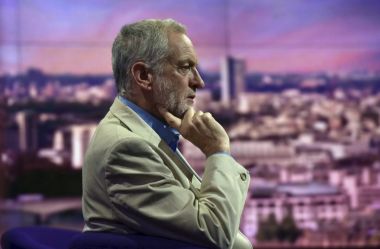Corbyn calls for large-scale renationalisation amid warnings of party meltdown

The surprise contender to lead Britain's Labour Party said on Sunday he believed swaths of the economy should be renationalised as a battle for the party's soul prompted warnings it could split in two.
Labour, which in May suffered its worst election defeat in almost three decades, is choosing a new leader it hopes can challenge Prime Minister David Cameron's Conservatives in 2020.
The unexpected success of Jeremy Corbyn, the most left-leaning of four leadership candidates, has dominated the contest, sparking warnings from rivals he would consign the party of triple election winner Tony Blair to "oblivion".
Blair, in office from 1997-2007, has himself intervened to urge Labour to reject Corbyn and embrace more centrist candidates if it wants to regain power, advice dismissed by Corbyn as misguided.
Corbyn, 66, a veteran parliamentarian, initially struggled to even get on the slate. But he has since enjoyed a surge in support with one opinion poll predicting he will triumph in a process set to culminate on September 12.
On Sunday, he fleshed out his policies, praising Karl Marx, the author of The Communist Manifesto, and speaking out in favour of the railways, postal service and power utilities being returned to public ownership.
"Marx analysed what was happening in a quite brilliant way," Corbyn told BBC TV's Andrew Marr Show. "If we are investing in infrastructure then we the public should get the benefit of it."
British taxpayers had invested "billions" in the railway network over the years so it was right it be put back in public hands, he said, and the energy market was "a false market" which should be reorganised to become a "publicly run service".
He also singled out the nuclear, water supply and telecommunications industries for criticism.
The three other candidates vying to lead the party are health spokesman Andy Burnham, widely seen as the most likely to beat Corbyn, home affairs spokeswoman Yvette Cooper, and Liz Kendall, considered by some to be the Blairite candidate.
One Labour MP, John Mann, told The Sunday Times newspaper he thought the contest should be halted because of what he said were hard-left infiltrators signing up to back Corbyn. Corbyn said he put the surge in support down to young people he said were finally enthused about politics.
Andy Burnham told The Sunday Mirror newspaper he was worried the contest was causing too much division within the party – with allegations of sexism and vote-rigging being thrown about – and that there was now a "real risk" it could split if dragged in the wrong direction.
"Becoming a party of protest riven by factions is of no use. If that is what happens, they (the people) will conclude Labour has become irrelevant – and they would be right."











